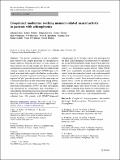Complexin2 modulates working memory-related neural activity in patients with schizophrenia
Author(s)
Hass, Johanna; Walton, Esther; Kirsten, Holger; Turner, Jessica; Roessner, Veit; Holt, Daphne; Sponheim, Scott R.; Calhoun, Vince D.; Wolthusen, Rick; Ehrlich, Stefan; Gollub, Randy Lyanne; ... Show more Show less
Download406_2014_Article_550.pdf (322.6Kb)
PUBLISHER_POLICY
Publisher Policy
Article is made available in accordance with the publisher's policy and may be subject to US copyright law. Please refer to the publisher's site for terms of use.
Terms of use
Metadata
Show full item recordAbstract
The specific contribution of risk or candidate gene variants to the complex phenotype of schizophrenia is largely unknown. Studying the effects of such variants on brain function can provide insight into disease-associated mechanisms on a neural systems level. Previous studies found common variants in the complexin2 (CPLX2) gene to be highly associated with cognitive dysfunction in schizophrenia patients. Similarly, cognitive functioning was found to be impaired in Cplx2 gene-deficient mice if they were subjected to maternal deprivation or mild brain trauma during puberty. Here, we aimed to study seven common CPLX2 single-nucleotide polymorphisms (SNPs) and their neurogenetic risk mechanisms by investigating their relationship to a schizophrenia-related functional neuroimaging intermediate phenotype. We examined functional MRI and genotype data collected from 104 patients with DSM-IV-diagnosed schizophrenia and 122 healthy controls who participated in the Mind Clinical Imaging Consortium study of schizophrenia. Seven SNPs distributed over the whole CPLX2 gene were tested for association with working memory-elicited neural activity in a frontoparietal neural network. Three CPLX2 SNPs were significantly associated with increased neural activity in the dorsolateral prefrontal cortex and intraparietal sulcus in the schizophrenia sample, but showed no association in healthy controls. Since increased working memory-related neural activity in individuals with or at risk for schizophrenia has been interpreted as ‘neural inefficiency,’ these findings suggest that certain variants of CPLX2 may contribute to impaired brain function in schizophrenia, possibly combined with other deleterious genetic variants, adverse environmental events, or developmental insults.
Date issued
2014-10Department
Martinos Imaging Center (McGovern Institute for Brain Research at MIT); Harvard University--MIT Division of Health Sciences and Technology; McGovern Institute for Brain Research at MITJournal
European Archives of Psychiatry and Clinical Neuroscience
Publisher
Springer Berlin Heidelberg
Citation
Hass, Johanna et al. “Complexin2 Modulates Working Memory-Related Neural Activity in Patients with Schizophrenia.” European Archives of Psychiatry and Clinical Neuroscience 265.2 (2015): 137–145.
Version: Author's final manuscript
ISSN
0940-1334
1433-8491